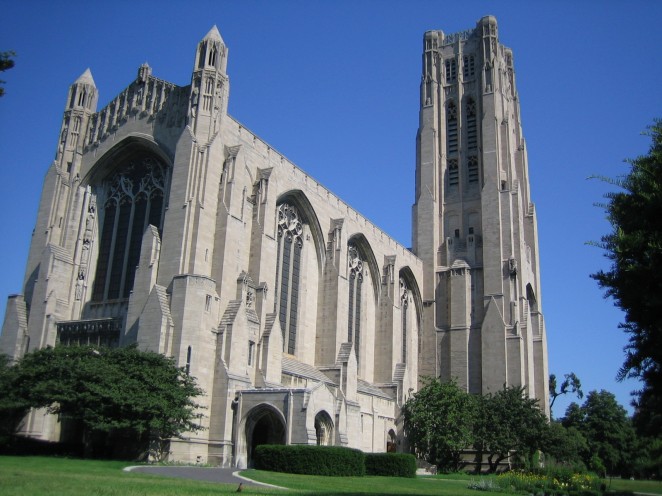a guest post by Elizabeth Davenport, Dean of Rockefeller Chapel
The first time I heard Spektral Quartet play I thought, “It would be out of this world to get these guys to come and play at Rockefeller Chapel.” And now it’s happening! Seven days from now, to be precise: March 28, 2013. They’re going to play Haydn’s Seven Last Words of Christ in the context of a dramatic liturgical moment of the year – the Tenebrae of the night before Good Friday, a night when we strip the Chapel bare of all the extras, candles and fabrics and silver.
Rockefeller Chapel is a vast space. The word “chapel” conjures up an intimate space, but it really means a private space – like the chapel of a stately home, or of a hospital, or of an airport… or, in this case, of a university. Rockefeller Chapel is the spiritual and ceremonial center of the University of Chicago, where the Spektral Quartet is ensemble in residence.
Rockefeller Chapel is a place where we engage in art and performance on a large scale, matching its eighty-foot high arches and resonant stone with grandeur of sound and beauty of image and word. It’s a place where we speak to the nobility of our human quest for meaning and our great capacity for awe, as generations before us intended for us to do. It’s a place where people of many different traditions find a spiritual home. Designed after the shape of a great medieval cathedral, it’s used today in ways which mirror the world’s changing patterns of human religious encounter. But, as it was at the beginning, it’s still a place where the liturgical seasons of the Christian year are observed, along with its many other uses.
And so we gather for the solemn ceremonies of Holy Thursday – a short, stark, bare celebration at the altar, with bread and wine and hardly any music, and then the sounds of Haydn, the slow movements of the Seven Last Words, ringing through the gradually darkening building in the première of a new Spektral arrangement prepared by their friend and collaborator Joe Clark. And with it, the last words of Christ as recorded in sacred text, juxtaposed with poetry. We use poetry often at the Chapel, finding in its art a means of touching truths of new kinds (in an era where once unquestioned beliefs no longer make sense to many). On this night, we will use poetry written at or after the unthinkable death of one too young to die – a mother mourning the death of her son, which is after all part of the time-honored script of the crucifixion.
Last words. One poem for each “word,” and the closing heart-rending words of Psalm 22 (“my God, my God, why have you forsaken me?”). The terrible knock at the door in the early hours of the morning… the police officer standing there and saying, “I’m sorry.” And then il terremoto, the earthquake, the fast, furious presto, the sudden, sharp end.
It’s an experiment, like much of what we do. We haven’t done Holy Thursday quite like this before, and Haydn’s cherished work hasn’t been played quite like this before. But in this space, and on this night, the script is rewritten. Rewritten for today, for now, for the mothers who have lost their sons and daughters, for the young caught up in the violence that tears us apart, now as then.
We read and we listen – and perhaps we gain some new insight into the old, old story, and for sure we hear afresh Haydn’s achingly beautiful writing. And we mourn for the lives lost, for the tragedy of it all. And yet, even in despair, we find some fragment of hope – some chord that lifts us out of our reverie, some new thing, some sense (as is the promise of Easter) that there is more to come.
If you’re anywhere near Chicago on March 28, I hope you’ll be there (7 pm at Rockefeller Chapel at Woodlawn and 59th). And if you’re not anywhere near Chicago, please make your travel arrangements now. You should not miss the Spektral Quartet offering their magnificent artistry in this most wondrous of spaces on this most solemn of nights… with their very own re-imagining of this beloved music.



